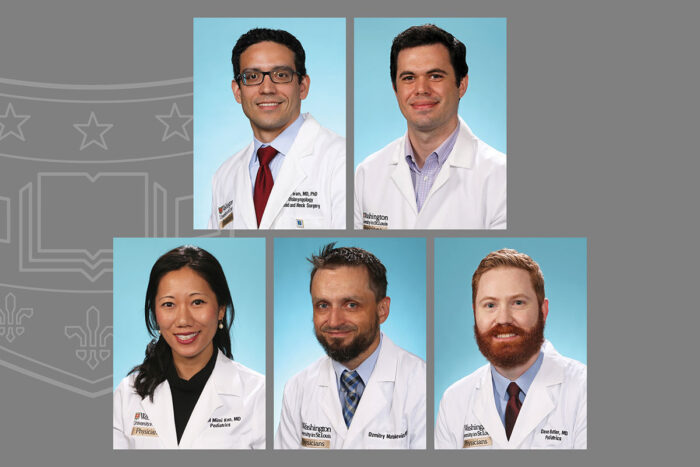5 physician-scientists named to newest class of Dean’s Scholars
Program supports doctors engaged in biomedical research
 Washington University School of Medicine
Washington University School of MedicineThe Division of Physician-Scientists at Washington University School of Medicine in St. Louis has announced its fifth class of Dean’s Scholars. They are (top, from left): R. Alex Harbison, MD, and Joshua Siner, MD; and (bottom, from left) Carol M. Kao, MD; Dzmitry Matsiukevich, MD; and David F. Butler, MD.
Physicians who pursue research often play a key role in the discovery of new, innovative approaches to diagnosing and treating patients. The Dean’s Scholars initiative at Washington University School of Medicine in St. Louis aims to nurture the careers of such doctors so they can more easily treat patients while also pursuing laboratory-based biomedical research.
The initiative, established in 2020 by the Division of Physician-Scientists at the School of Medicine, provides budding physician-scientists with funding and mentorship for up to two years to foster the careers of such individuals while also sparking new possibilities in medical science. Their positions as clinicians and the corresponding time they spend performing patient care give them an avenue through which to identify pressing clinical questions. They can then turn toward laboratory-based research in search of answers, often resulting in improved care for patients.
The division recently announced its fifth class of Dean’s Scholars. They are: David F. Butler, MD; R. Alex Harbison, MD; Carol M. Kao, MD; Dzmitry Matsiukevich, MD; and Joshua Siner, MD. The new scholars were chosen after a competitive application cycle.
“This year’s Dean’s Scholars are outstanding physician-scientists who have shown tremendous talent in their research while also demonstrating determination to improve patient care,” said David H. Perlmutter, MD, executive vice chancellor for medical affairs, the George and Carol Bauer Dean of the School of Medicine, and the Spencer T. and Ann W. Olin Distinguished Professor. “Physician-scientists are uniquely positioned to let their patient interactions influence and guide the research they pursue, and this program provides them with the support necessary to carry out these endeavors.”
The program is funded by a Physician-Scientist Institutional Award from the Burroughs Wellcome Fund, a nonprofit organization that, through research and education, supports biomedical science. The School of Medicine and its departments also provide financial support for the program.
“The Dean’s Scholars program is designed to drive our physician-scientists toward potentially life-changing experiences they may have believed were not possible as physicians,” said Wayne M. Yokoyama, MD, director of the Division of Physician-Scientists, the Sam J. Levin and Audrey Loew Levin Professor of Arthritis Research, and an associate dean. “This program is proving to be inspirational for those selected and a spark for innovation. We are excited to see what this year’s scholars will do.”
This year’s Dean’s Scholars
Butler, an assistant professor of pediatrics in the department’s critical care medicine division, will examine the complex relationships between human aging, neuronal biology, and brain injuries that result from restricted oxygen flow. Recognizing that aging impacts the severity of and recovery from such injuries, Butler will seek to find a unique and innovative method to characterize age-associated responses to these brain injuries. His primary project mentor is Andrew Yoo, PhD, a professor of developmental biology who investigates how aging in human neurons contributes to the late onset of neurodegeneration in various neurodegenerative disorders.
Harbison, an assistant professor in the Department of Otolaryngology — Head & Neck Surgery, will conduct basic and translational research aimed at reducing deaths from head and neck cancers. He plans to investigate the role of extracellular polyamines — organic compounds essential to cellular growth — on T cell function in the tumor microenvironment. T cells are white blood cells belonging to the immune system that can help protect the body from infection and may help fight cancer. Harbison’s project mentor is Guangyong Peng, MD, PhD, a professor of otolaryngology — head and neck surgery, who is well-recognized in the field of tumor immunology.
Kao, an associate professor of pediatrics in the department’s infectious diseases division, will research components of maternal vaccination that influence the development of protective responses in infants, including timing of vaccination during pregnancy. Infections are a significant cause of infant and childhood mortality worldwide. To help address mortality rates, Kao aims to advance understanding of Staphylococcus aureus immunity to guide the development of a maternal or infant vaccination strategy. Kao’s project mentor is Juliane Bubeck Wardenburg, MD, PhD, the Donald B. Strominger, MD, Professor of Pediatrics, and director of the pediatrics department’s Division of Critical Care Medicine.
Matsiukevich, an assistant professor of pediatrics in the department’s divisions of critical care medicine and cardiology, will conduct research on heart failure with preserved ejection fraction, a clinical syndrome with multisystem organ dysfunction in which patients develop symptoms of heart failure alongside other bodily abnormalities. Matsiukevich aims to identify the genes that mediate this disease’s progression and will examine how the fluctuation of fibroblast growth factor signaling – which governs fundamental cellular processes including proliferation, differentiation and embryonic development – can impact progression. Matsiukevich’s project mentor, David Ornitz, MD, PhD, the Alumni Endowed Professor of Developmental Biology, specializes in understanding fibroblast growth factors.
Siner, a clinical fellow in hematology and oncology, aims to study tumor necrosis factor alpha – a cytokine – and how it influences inflammatory signaling and triggers a hyper-reactive state associated with blood clots, which can be deadly. Siner’s research will identify molecular drivers behind thrombosis within inflammation, called immunothrombosis. The ultimate goal of the work is to identify new therapeutic targets for these diseases that could offset adverse effects of bleeding, a common adverse effect in the treatment of blood clots. Siner’s project mentor is Jorge Di Paola, MD, a professor of pediatrics with an emphasis on molecular genetics and genomics, and director of the hematology & oncology division in pediatrics. Also the Elizabeth Finney McDonnell Chair in Pediatric Hematology/Oncology, Di Paola focuses on the genetics of bleeding and thrombotic disorders.







